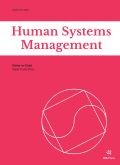Authors: Shard, | Kumar, Devesh | Koul, Sapna
Article Type:
Research Article
Abstract:
BACKGROUND: Data-driven practices are now crucial in the digital age for streamlining operations and boosting output across a range of industries. With e-Learning emerging as a cutting-edge and promising strategy to improve educational delivery and student engagement, higher education institutions are also adopting this trend. Despite the potential advantages, e-Learning adoption in higher education is still a developing topic with scant published research. OBJECTIVE: This study aims to conduct a thorough analysis of existing literature, seeking to determine the present status of e-Learning adoption in higher education while also identifying promising avenues for further research.
…METHODS: In this study, a systematic literature review methodology and a bibliometric approach are utilized to examine 63 papers sourced from the Scopus database, encompassing the years 2017 to 2021. These papers were specifically chosen due to their pertinence to e-Learning adoption in higher education institutions, following the exclusion and inclusion criteria outlined in the preferred reporting items for systematic reviews and meta-analyses (PRISMA) framework. The analysis techniques employed include descriptive overviews, citation analysis, and keyword co-occurrence. RESULTS: The systematic review of the literature revealed a significant increase in e-Learning adoption within higher education institutions (HEIs) in recent times. The findings highlighted several crucial factors influencing e-Learning adoption, including perceived ease of use, usefulness, learner attitude, self-efficacy, and facilitating conditions. However, further investigation is needed to better understand the impact of perceived learning and teaching styles on e-Learning acceptance in higher education settings. CONCLUSION: This study suggests conducting future investigations on e-Learning in developing countries, with a specific focus on intention, usage, adoption, and impact. Additionally, it emphasizes the importance of exploring the influence of learning and teaching styles on e-Learning acceptance within higher education institutions. These valuable insights will facilitate the development of effective strategies for the successful implementation of e-Learning in higher education settings.
Show more
Keywords: Acceptance, adoption, e-Learning, higher education institutes, information, and communication technology (ICT), learning management system (LMS), systematic literature review (SLR)
DOI: 10.3233/HSM-230190
Citation: Human Systems Management,
vol. Pre-press, no. Pre-press, pp. 1-22, 2024
Price: EUR 27.50




